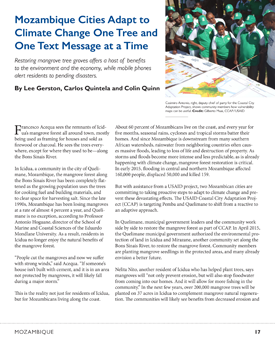Mozambique’s coastal cities, which are some of the areas most vulnerable to climate change in Africa, must adapt to extreme weather and become more resilient.

Mozambique CCAP in USAID Frontlines: Cities Adapt to Climate Change One Tree and One Text Message at a Time .
Project Success Story | December 24, 2018

USAID’s Coastal City Adaptation Project worked with local communities in Mozambique to restore mangrove trees, which offers a host of benefits to the environment and the economy, while encouraging the use of mobile phones to alert residents of pending disasters.
With assistance from USAID’s Coastal City Adaptation Project (CCAP), two Mozambican cities are committing to taking proactive steps to adapt to climate change and pre- vent devastating ecological effects. CCAP is targeting Pemba and Quelimane to shift from a reactive to an adaptive approach. In Quelimane, municipal government leaders and the community work side by side to restore the mangrove forest as part of CCAP. In April 2015, the Quelimane municipal government authorized the environmental protection of land in Icidua and Mirazane, another community set along the Bons Sinais River, to restore the mangrove forest. Community members are planting mangrove seedlings in the protected areas, and many already envision a better future.
Meanwhile, USAID and the Mozambican National Institute of Disaster Management, (similar to the Federal Emergency Management Agency in the United States) have developed a mobile phone-based early warning, emergency response and data collection system for extreme weather events in Pemba and Quelimane. Mobile phones are the primary means of communication in communities in Mozambique and every household has access to one. This system allows communities to quickly learn about and prepare for disaster, so a repeat of the March 2014 flooding in Pemba doesn’t happen.
